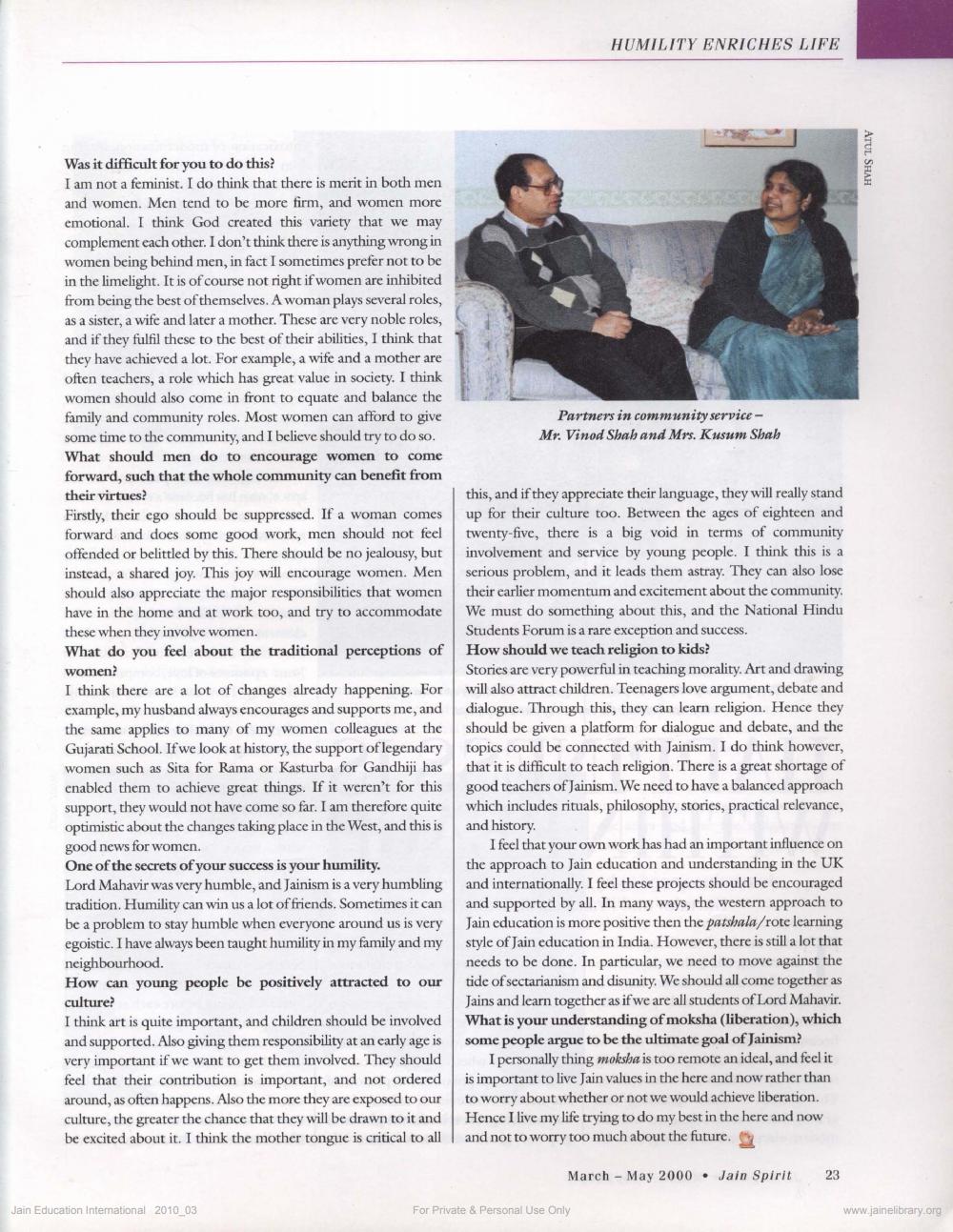________________
HUMILITY ENRICHES LIFE
ATUL SHAH
Partners in community service - Mr. Vinod Shab and Mrs. Kusum Shah
Was it difficult for you to do this? I am not a feminist. I do think that there is merit in both men and women. Men tend to be more firm, and women more emotional. I think God created this variety that we may complement each other. I don't think there is anything wrong in women being behind men, in fact I sometimes prefer not to be in the limelight. It is of course not right if women are inhibited from being the best of themselves. A woman plays several roles, as a sister, a wife and later a mother. These are very noble roles, and if they fulfil these to the best of their abilities, I think that they have achieved a lot. For example, a wife and a mother are often teachers, a role which has great value in society. I think women should also come in front to equate and balance the family and community roles. Most women can afford to give some time to the community, and I believe should try to do so. What should men do to encourage women to come forward, such that the whole community can benefit from their virtues? Firstly, their ego should be suppressed. If a woman comes forward and does some good work, men should not feel offended or belittled by this. There should be no jealousy, but instead, a shared joy. This joy will encourage women. Men should also appreciate the major responsibilities that women have in the home and at work too, and try to accommodate these when they involve women. What do you feel about the traditional perceptions of women? I think there are a lot of changes already happening. For example, my husband always encourages and supports me, and the same applies to many of my women colleagues at the Gujarati School. If we look at history, the support of legendary women such as Sita for Rama or Kasturba for Gandhiji has enabled them to achieve great things. If it weren't for this support, they would not have come so far. I am therefore quite optimistic about the changes taking place in the West, and this is good news for women. One of the secrets of your success is your humility. Lord Mahavir was very humble, and Jainism is a very humbling tradition. Humility can win us a lot of friends. Sometimes it can be a problem to stay humble when everyone around us is very egoistic. I have always been taught humility in my family and my neighbourhood. How can young people be positively attracted to our culture? I think art is quite important, and children should be involved and supported. Also giving them responsibility at an early age is very important if we want to get them involved. They should feel that their contribution is important, and not ordered around, as often happens. Also the more they are exposed to our culture, the greater the chance that they will be drawn to it and be excited about it. I think the mother tongue is critical to all
this, and if they appreciate their language, they will really stand up for their culture too. Between the ages of eighteen and twenty-five, there is a big void in terms of community involvement and service by young people. I think this is a serious problem, and it leads them astray. They can also lose their earlier momentum and excitement about the community, We must do something about this, and the National Hindu Students Forum is a rare exception and success. How should we teach religion to kids? Stories are very powerful in teaching morality. Art and drawing will also attract children. Teenagers love argument, debate and dialogue. Through this, they can learn religion. Hence they should be given a platform for dialogue and debate, and the topics could be connected with Jainism. I do think however, that it is difficult to teach religion. There is a great shortage of good teachers of Jainism. We need to have a balanced approach which includes rituals, philosophy, stories, practical relevance, and history.
I feel that your own work has had an important influence on the approach to Jain education and understanding in the UK and internationally. I feel these projects should be encouraged and supported by all. In many ways, the western approach to Jain education is more positive then the patshala/rote learning style of Jain education in India. However, there is still a lot that needs to be done. In particular, we need to move against the tide of sectarianism and disunity. We should all come together as Jains and learn together as if we are all students of Lord Mahavir. What is your understanding of moksha (liberation), which some people argue to be the ultimate goal of Jainism?
I personally thing moksha is too remote an ideal, and feel it is important to live Jain values in the here and now rather than to worry about whether or not we would achieve liberation. Hence I live my life trying to do my best in the here and now and not to worry too much about the future.
March - May 2000 • Jain Spirit
Jain Education International 2010_03
For Private & Personal Use Only
www.jainelibrary.org




